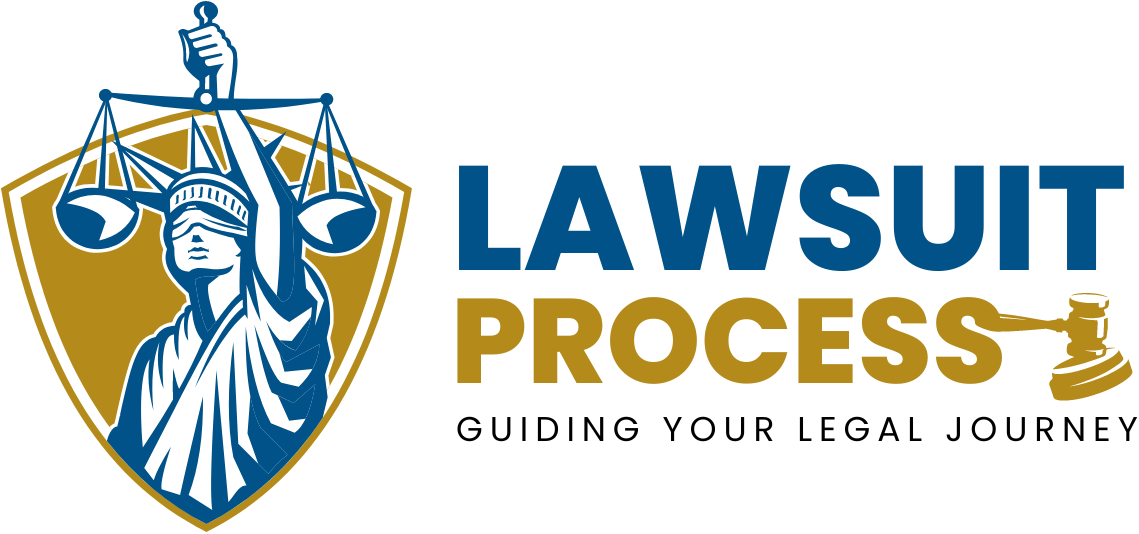Legal disputes happen all the time. When people or businesses can’t agree on something, they might need help from a judge or court to decide what’s fair. This is called litigation.
In this article, we’ll answer the question: What is litigation? We’ll also explain how it works, the types of disputes it handles, and what challenges people face when going to court. We’ll also talk about other ways to solve problems without a judge or going to court.
Table of Contents
- What Is Litigation?
- Types of Legal Disputes
- How Does Litigation Work?
- Why Litigation Is Important
- Alternatives to Litigation
- Common Problems with Litigation
- Summary
- Litigation Frequently Asked Questions (FAQs)
What Is Litigation?
Litigation is just a big word for going to court to settle a disagreement. It happens when two or more people, companies, or groups can’t agree on something and need a judge or jury to decide. For example, if a customer feels a company broke a promise, they might sue the company. And this lawsuit is part of the litigation process.
Types of Legal Disputes
There are many reasons people go to court. Here are some common ones:
- Money Problems: Like when someone doesn’t pay what they owe or breaks a contract.
- Injuries: If someone gets hurt in an accident and wants to be compensated.
- Family Issues: Things like divorce, child custody, or who gets what in a will.
- Crimes: When someone breaks the law, like stealing or harming someone.
- Business Conflicts: For example, two companies arguing over a deal or idea.
- Environmental Issues: Cases about pollution or land use.
How Does Litigation Work?
Litigation usually follows these steps:
- Filing a Case: The person with the complaint (called the plaintiff) tells the court what went wrong by filing papers.
- Responding: The person being sued (the defendant) explains their side of the story.
- Sharing Information: Both sides exchange evidence like documents or witness statements to prepare for the trial. This step is called discovery.
- Going to Trial: Both sides tell their story to a judge or jury, who then decide the outcome.
- Making an Appeal: If someone doesn’t agree with the decision, they can ask a higher court to review it.
Why Litigation Is Important
Litigation helps make things fair. If someone breaks a rule or causes harm, the court can hold them accountable. Courts also help protect people’s rights, like making sure everyone follows contracts or pays for damages. Without litigation, it would be harder to solve serious disagreements.
Alternatives to Litigation
Going to court isn’t always the best way to solve a problem. Other methods include:
- Mediation: A neutral person helps both sides talk and find a solution they agree on.
- Arbitration: Both sides present their case to an arbitrator, who makes a decision without a trial.
- Negotiation: The two sides work together directly to settle their disagreement.
These methods are usually faster, cheaper, and less stressful than litigation.
Common Problems with Litigation
While litigation can solve problems, it has some downsides:
- Cost: Lawyers, court fees, and other expenses can add up quickly.
- Time: Some cases take months or even years to finish.
- Stress: Court cases can be emotionally draining for everyone involved.
- Public Records: Trials are usually public, so private details might become known to others.
Summary
Litigation is the legal process of solving disputes in court. It is important for keeping things fair and holding people accountable, but it can also be expensive and stressful. Many types of issues, from business conflicts to personal injuries, can lead to litigation. Sometimes, alternatives like mediation or arbitration work better than going to court. Therefore, by understanding the basics of litigation, you can decide the best way to handle legal problems.
- Litigation means solving problems in court.
- Common disputes involve money, injuries, family, and business issues.
- The process includes filing, discovery, trial, and sometimes appeals.
- Alternatives like mediation can save time and money.
- Litigation can be costly and take a long time.
If you need legal assistance, consult a lawyer who can work with you.
Litigation Frequently Asked Questions (FAQs)
1. What is litigation?
Litigation is the legal process of resolving disputes through the court system. It involves filing a lawsuit, presenting evidence, and having a judge or jury decide the outcome.
2. What are the stages of litigation?
Litigation typically involves several stages: pre-litigation, pleadings, discovery, pre-trial, trial, and post-trial. Each phase involves specific legal procedures and deadlines.
3. How does a lawsuit start?
A lawsuit begins when the plaintiff files a complaint with the court and serves it on the defendant. The complaint outlines the legal claims and what the plaintiff seeks in relief.
4. What is a complaint in litigation?
A complaint is a formal legal document filed by the plaintiff to initiate a lawsuit. It states the facts of the case, the legal basis for the claim, and the damages or relief sought.
5. Who are the parties in a lawsuit?
The two main parties in a lawsuit are the plaintiff (the one bringing the case) and the defendant (the one being sued). In some cases, there can be multiple plaintiffs or defendants.
6. What is a summons?
A summons is a legal notice informing the defendant that a lawsuit has been filed and that they are required to respond within a specified time.
7. What is an answer in litigation?
An answer is the defendant’s formal response to the complaint. It may admit or deny the allegations and can include defenses and counterclaims.
8. What is discovery in litigation?
Discovery is the process where both parties exchange information and evidence relevant to the case. This includes written questions, documents, and depositions.
9. What is a deposition?
A deposition is a sworn, out-of-court testimony given by a witness or party involved in the lawsuit. It is recorded for later use in court proceedings.
10. How long does litigation take?
The duration of litigation varies depending on the complexity of the case, court schedule, and whether the case settles. It can range from several months to years.
11. What is a motion in litigation?
A motion is a formal request asking the court to make a decision on a legal issue before or during a trial. Common motions include motions to dismiss or motions for summary judgment.
12. What is a summary judgment?
A summary judgment is a decision by the court without a full trial. It is granted when there are no disputed facts and the moving party is entitled to judgment as a matter of law.
13. What happens during a trial?
During a trial, both parties present evidence and arguments to a judge or jury. Witnesses may testify, and at the end, a verdict is reached based on the facts and law.
14. What is a verdict?
A verdict is the decision made by a judge or jury at the end of a trial. It determines which party wins and what relief or damages will be awarded.
15. Can I appeal a litigation decision?
Yes. If you believe there was a legal error in your case, you may appeal the decision to a higher court within a specific time frame after the judgment.
16. What is an appeal?
An appeal is a legal process in which a higher court reviews the decision of a lower court to determine if there were any legal errors that affected the outcome.
17. What are legal pleadings?
Pleadings are formal written statements filed with the court that outline each party’s claims and defenses. These include the complaint, answer, and any motions.
18. What is alternative dispute resolution (ADR)?
ADR refers to methods like mediation and arbitration used to resolve disputes outside of court. These options are often faster and less costly than litigation.
19. What is mediation?
Mediation is a process where a neutral third party helps disputing parties reach a voluntary agreement. It is non-binding and confidential.
20. What is arbitration?
Arbitration is a private process where a neutral arbitrator hears evidence and makes a binding or non-binding decision to resolve a dispute.
21. What is the statute of limitations?
The statute of limitations is the time limit for filing a lawsuit. If you miss this deadline, your claim may be barred forever.
22. What is a civil lawsuit?
A civil lawsuit involves private disputes between individuals or organizations over legal responsibilities and damages, as opposed to criminal prosecution.
23. What is a class action lawsuit?
A class action is a lawsuit filed by one or more plaintiffs on behalf of a larger group who have suffered similar harm from the same defendant.
24. What is a settlement?
A settlement is an agreement between parties to resolve a dispute without continuing to trial. It usually involves payment or other terms both sides accept.
25. Can litigation be avoided?
Yes. Litigation can often be avoided through negotiation, mediation, or arbitration, which are typically faster and less adversarial.
26. How much does litigation cost?
Litigation costs vary widely depending on the case. Expenses may include attorney fees, filing fees, expert witnesses, and discovery costs.
27. What is pro se litigation?
Pro se litigation is when a person represents themselves in court without an attorney. It’s legal but can be challenging due to complex procedures.
28. Do I need a lawyer for litigation?
While not always required, having a lawyer greatly improves your chances of success. Lawyers understand legal procedures and can build a strong case.
29. What happens if I lose a lawsuit?
If you lose, you may be ordered to pay damages, legal costs, or comply with the court’s orders. You may also have the right to appeal the decision.
30. What is a counterclaim?
A counterclaim is a legal claim brought by the defendant against the plaintiff in response to the original complaint.
31. What is a cross-claim?
A cross-claim is a claim filed by one defendant against another in the same lawsuit, asserting that the other is responsible for some or all of the damages.
32. What are damages in litigation?
Damages are the monetary compensation awarded to a party for loss or injury caused by the other party’s actions or negligence.
33. What is injunctive relief?
Injunctive relief is a court order requiring a party to do or stop doing a specific act. It’s often used in cases involving ongoing harm.
34. Can businesses be involved in litigation?
Yes. Businesses can sue or be sued in various types of litigation, including contract disputes, employment issues, and intellectual property matters.
35. What is tort litigation?
Tort litigation involves lawsuits based on wrongful acts that cause harm, such as personal injury, negligence, or defamation.
36. What is breach of contract litigation?
This type of litigation arises when one party fails to fulfill their obligations under a legally binding agreement, and the other party seeks compensation or enforcement.
37. What is legal discovery?
Discovery is the legal process during which parties gather and exchange evidence and information relevant to the case to prepare for trial.
38. What are interrogatories?
Interrogatories are written questions that one party sends to the other during discovery. The recipient must respond in writing under oath.
39. What is a subpoena?
A subpoena is a legal order requiring a person to appear in court or produce documents relevant to a case.
40. Can a lawsuit be dismissed?
Yes. A lawsuit can be dismissed voluntarily by the plaintiff or by the court if legal grounds exist, such as lack of jurisdiction or failure to state a claim.
41. What is jurisdiction?
Jurisdiction refers to the court’s authority to hear a case. It depends on the subject matter and the parties’ connection to the location.
42. What is venue in litigation?
Venue refers to the geographic location where a lawsuit should be filed. It’s usually based on where the events occurred or where the parties live.
43. What are court costs?
Court costs include fees associated with filing documents, serving papers, and using court resources. They may be recovered by the winning party.
44. What is legal liability?
Legal liability means being legally responsible for damages or losses caused by your actions or failure to act appropriately.
45. What is strict liability?
Strict liability holds a party legally responsible for harm regardless of intent or negligence, often in product liability or hazardous activity cases.
46. What is negligence?
Negligence is a failure to exercise reasonable care, resulting in harm to another person. It is a common basis for civil lawsuits.
47. What is punitive damages?
Punitive damages are awarded to punish the wrongdoer and deter similar conduct, in addition to compensatory damages for the victim.
48. What is a default judgment?
A default judgment occurs when the defendant fails to respond to the lawsuit, and the court awards victory to the plaintiff by default.
49. What is small claims court?
Small claims court handles minor civil disputes involving limited dollar amounts. It’s more informal and usually doesn’t require an attorney.
50. Can litigation be confidential?
Litigation is generally public, but courts can seal records or allow confidential proceedings in certain cases, like those involving trade secrets.
51. What is a legal brief?
A legal brief is a written argument presented to the court outlining the facts, legal issues, and supporting laws in a case.
52. What is an expert witness?
An expert witness is someone with specialized knowledge who testifies to help the court understand technical aspects of the case.
53. Can litigation affect credit?
Yes. If you’re ordered to pay damages and don’t comply, the judgment may appear on your credit report, affecting your score.
54. What is litigation hold?
A litigation hold is an order to preserve all relevant documents and information when litigation is anticipated or underway.
55. What is electronic discovery (e-discovery)?
E-discovery involves the collection and exchange of electronically stored information (ESI) like emails, documents, and databases during litigation.
56. What is a retainer fee?
A retainer fee is an upfront payment to hire an attorney, who bills against it as work is performed on the case.
57. Can I sue for emotional distress?
Yes, if you can prove severe emotional harm caused by another’s negligent or intentional conduct. This is often part of personal injury claims.
58. What is legal malpractice litigation?
This involves suing an attorney for negligence, breach of contract, or other misconduct that caused harm to a client’s case.
59. What is a legal remedy?
A legal remedy is the way a court enforces a right, imposes a penalty, or makes another court order to resolve a dispute.
60. What happens after a lawsuit is resolved?
After resolution, the court issues a final judgment. If money is awarded, collection begins. The parties may also comply with court orders or file appeals.










